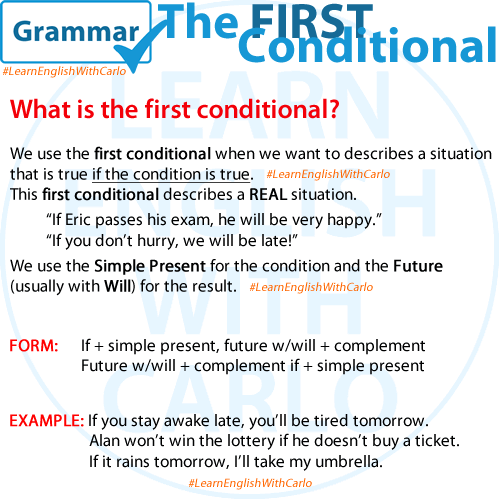What is the first conditional?
The First Conditional is used to talk about situations that are likely or possible in the future. It describes a real, specific outcome that will happen if a condition is met.
Example Sentences:
- If Eric passes his exam, he will be very happy.
- If you don’t hurry, we will be late!
This conditional structure helps us talk about things that are realistic or likely in the future as long as the condition in the sentence is fulfilled.
We use the Simple Present for the condition and the Future (usually with will) for the result.
FORM:
If + simple present, future w/will + complement
Future w/will + complement if + simple present
NOTE: When the condition clause comes first, we use a comma before the result.
EXAMPLE:
If you stay awake late, you’ll be tired tomorrow.
Alan won’t win the lottery if he doesn’t buy a ticket.
If it rains tomorrow, I’ll take my umbrella.
How to Use the First Conditional in Everyday Situations
The First Conditional is often used to:
- Give warnings or advice: If you don’t bring a coat, you’ll be cold.
- Discuss plans or intentions: If I finish work early, I’ll meet you at the café.
- Talk about cause-and-effect relationships: If you water the plants, they’ll grow faster.
Practice Exercises
Try to make your own sentences using the First Conditional to talk about possible future outcomes. Examples of prompts could include:
- If I find extra time this weekend, I ___________.
- You’ll miss the bus if ___________.
- If it gets too hot tomorrow, ___________.
Summary
The First Conditional is a powerful tool for expressing future plans, possibilities, and outcomes that are likely to happen if certain conditions are met. Remember to use the Simple Present for the condition and will for the result.

FAQs About the First Conditional
1. When do we use the First Conditional?
We use the First Conditional to talk about real or possible situations in the future that depend on a specific condition. It’s often used for warnings, promises, offers, and advice about likely future events.
2. What is the structure of the First Conditional?
The structure is:
- If + simple present, will + base form of the verb
Examples:
- If you study, you will pass the test.
- I’ll call you if I finish early.
3. Can I reverse the clauses in the First Conditional?
Yes, you can. The meaning doesn’t change, but remember to omit the comma when the main clause comes first.
- If it rains, we’ll stay inside.
- We’ll stay inside if it rains.
4. Can I use “when” instead of “if” in the First Conditional?
Yes, but only if the event is certain to happen. “If” suggests a possibility, while “when” implies that the action will definitely occur.
- If it rains, I’ll take an umbrella. (It might rain.)
- When I finish work, I’ll call you. (I will definitely finish work.)
5. Are there alternatives to “will” in the main clause?
Yes. Instead of “will,” you can use modals like “can,” “might,” or “should” to express different meanings:
- If you finish early, you can join us. (permission)
- If he works hard, he might get a promotion. (possibility)
- If you’re tired, you should rest. (advice)
6. What’s the difference between the First and Zero Conditionals?
The Zero Conditional discusses general truths or facts that are always true, while the First Conditional talks about specific future situations that are likely to happen if the condition is met.
- Zero Conditional: If water reaches 100°C, it boils. (always true)
- First Conditional: If it rains tomorrow, we’ll stay home. (specific future possibility)
7. Can I use contractions in the First Conditional?
Yes! Contractions are common and make sentences sound more natural.
- If it doesn’t rain, we’ll go hiking.
- I’ll be happy if you come to the party.
